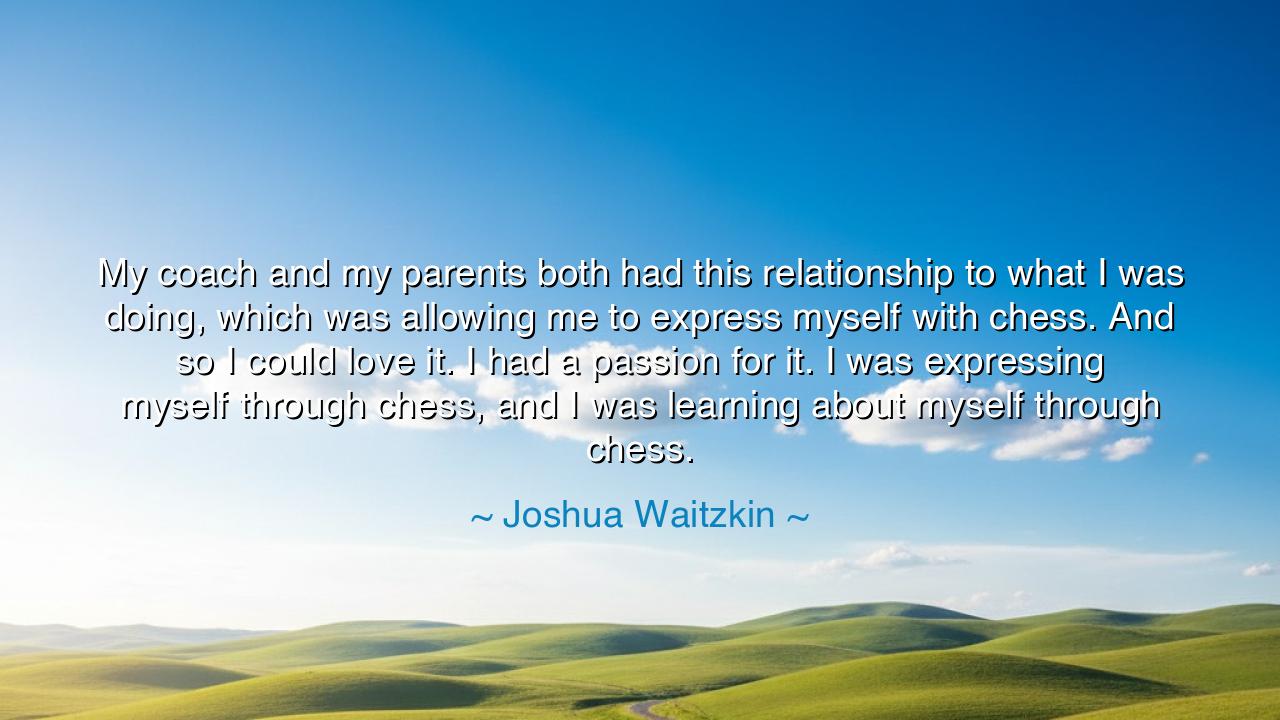
My coach and my parents both had this relationship to what I was
My coach and my parents both had this relationship to what I was doing, which was allowing me to express myself with chess. And so I could love it. I had a passion for it. I was expressing myself through chess, and I was learning about myself through chess.






In the voice of calm introspection and timeless wisdom, Joshua Waitzkin once said, “My coach and my parents both had this relationship to what I was doing, which was allowing me to express myself with chess. And so I could love it. I had a passion for it. I was expressing myself through chess, and I was learning about myself through chess.” These words, though spoken by a man of the modern world, carry the quiet resonance of the ancients. They speak not of competition or victory, but of self-discovery—of finding one’s reflection in the art of practice. To Waitzkin, chess was not a battlefield alone; it was a mirror for the soul. It was not about domination, but revelation. Through it, he came to know his own depths, his own rhythms, and the mysterious harmony between discipline and freedom.
The origin of this quote lies in Waitzkin’s own life—a child prodigy whose story inspired the film Searching for Bobby Fischer. From a young age, he was immersed in the intricate beauty of chess, a world of strategy and silence where mind meets mind. Yet what shaped him most was not the game itself, but the environment of freedom in which he was nurtured. His parents and coach did not chain his talent to ambition; they allowed it to breathe. They understood that mastery cannot be forced—it must grow like a tree, rooted in curiosity and watered by love. Through their guidance, Waitzkin’s pursuit of excellence became not a burden, but a path to self-expression.
In his words lies a truth as old as the academies of Greece and the gardens of Zen: every craft, when practiced with sincerity, becomes a way to know oneself. Whether it is painting, music, martial arts, or chess, the true student seeks not only to perform, but to become. The ancients called this harmony between art and identity arete—the pursuit of excellence not for applause, but for self-realization. For when a person creates from the heart, they do not imitate the world—they reveal their inner world to it. Waitzkin’s relationship with chess was thus not mechanical, but spiritual. It was a dialogue between his thoughts and his being, between what he understood and what he was yet to understand.
There is a story from the East that mirrors this truth. A master calligrapher, after decades of practice, was asked how he achieved such perfection in his brush strokes. He smiled and said, “At first, I tried to make the ink obey me. Then, I tried to obey the ink. Now, there is no ink, and no me—only the stroke.” In this way, art becomes meditation; effort becomes flow. So too, Waitzkin found in chess not a contest of intellects, but a living form of expression. When the boundaries between player and game dissolve, what remains is a kind of liberation—the pure joy of creation through mastery.
What is remarkable in Waitzkin’s story is not his genius, but his freedom. So many are crushed beneath the weight of expectation—students who study to please, athletes who perform to prove. But passion, when strangled by pressure, withers into duty. Waitzkin’s parents and coach understood what few do: that love for a craft is born not from demands, but from permission—to fail, to explore, to play. By giving him the space to express rather than conform, they allowed his talent to flourish naturally. His learning became an act of discovery, not obedience. And in discovering his moves on the board, he discovered his mind in life.
His words also carry a message for all who seek mastery: that learning and self-knowledge are one and the same. To truly learn something—be it an art, a science, or a way of living—is to look inward as much as outward. Every mistake becomes a teacher, every triumph a mirror. The artist learns not only technique, but patience; the warrior learns not only strength, but humility. The true education is not of the mind alone, but of the spirit. And in this sense, the game of chess becomes a metaphor for existence itself: each move a decision, each sacrifice a lesson, each victory a fleeting step toward understanding the infinite.
So let this wisdom pass down through the generations: Whatever your craft may be, approach it as a means of expression, not comparison. Do not chase perfection for the sake of pride, but pursue authenticity for the sake of truth. Allow your work to teach you about yourself—the limits of your patience, the depth of your curiosity, the fire of your passion. When you do so, every act of creation becomes sacred.
For in the end, Waitzkin’s message is one of harmony between discipline and freedom, mastery and self-discovery. The game, the art, the craft—these are not things apart from life, but reflections of it. To express oneself through one’s passion is to live in alignment with one’s purpose. To learn through one’s passion is to walk the path of awakening. And so, as the ancients would say: find your chessboard—whatever it may be—and play not to win, but to become.






AAdministratorAdministrator
Welcome, honored guests. Please leave a comment, we will respond soon